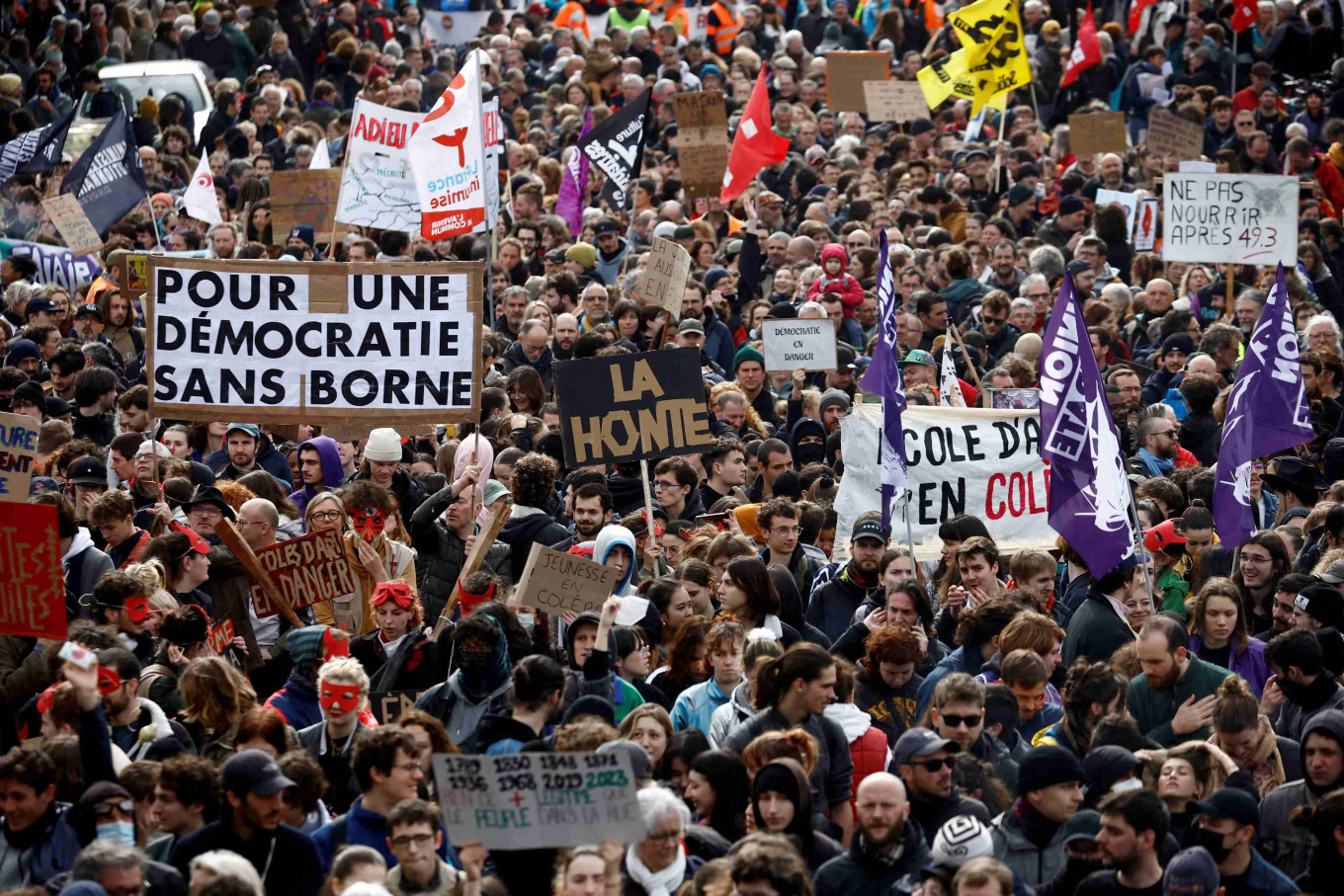Popular Reads
Top Results
Can't find what you're looking for?
View all search resultsPopular Reads
Top Results
Can't find what you're looking for?
View all search resultsComparing Macron’s pension reform ambition with Jokowi's omnibus law
Macron wants to leave an everlasting legacy to his nation, while the French people do not want to lose the privileges that make them different from their European neighbors.
Change text size
Gift Premium Articles
to Anyone
F
rench President Emmanuel Macron and President Joko “Jokowi” Widodo know each other quite well as they often met at the annual summits of the Group of 20. The two also face uphill challenges in their quest to leave a long-lasting legacy when they complete their terms.
Hundreds of thousands of people have taken to streets across France, often violently, over the last two months, to protest the far-reaching pension reform of President Macron, which will extend the mandatory retirement age from 62 to 64. Macron stands to his ground and will continue fighting for the reform agenda until he ends his second five-year term in 2027.
President Jokowi also has to deal with massive resistance from labor unions and students over the Job Creation Law and its replacement Regulation in lieu of Law (Perppu) on Job Creation, which critics deem as very much pro-investors. But Jokowi is luckier than Macron as resistance to the omnibus legislation weakened before the House of Representatives approved the Perppu last month.
The House passed the Jobs Law in October 2020 that in a single stroke amends 79 laws and eliminates thousands of regulations inimical to business and investment. But it will take several months more to prepare all the technical regulations needed to implement the new law.
The Jakarta Post reported that more than 90 percent of the law is designed to stimulate domestic and foreign investment by removing bureaucratic inefficiencies and excessive licensing requirements as well as opaque, overlapping and contradictory regulations that have long hindered competitiveness.
The law is widely praised by foreign investors because the regulation will streamline business rules in Southeast Asia's largest economy, which is notoriously known for its corrupt bureaucracy.
The Constitutional Court, however, declared in its judicial review the law conditionally unconstitutional as its deliberation process lacked public consultation. While the Court demanded a revision, the government chose to table a Perppu, which in general is similar to the previous law.
In France, President Macron used Article 49.3 of the Constitution to pass his pension reform last month. The article grants the president the executive power to pass a bill without voting from the parliament. The opposition has the right to challenge the president’s decision with a no-confidence motion. Macron defeated the opposition’s attempt to drop the bill, meaning that it will fully come into force by the end of this year. The Constitutional Council however still has the final say on the new law.
For the opposition, Macron’s action is a blatant violation of democracy. Macron has defeated the massive nationwide opposition easily in terms of legality. But as opinion polls have shown, the majority of the French people reject the pension reform, which means the agenda faces a question of legitimacy. Street demonstrations and labor strikes will likely continue and severely impact France’s economy and public order.
Le Monde quoted Macron as saying in a TV interview on March 22 that he is guided by "a sense of responsibility. Does this reform give me pleasure? No," he argued, presenting the image of a politician solely concerned with "the general interest." Whatever it takes. "If I have to take on unpopularity today, I will," he declared. He added that he has no regrets.
Macron’s predecessors such as Jacques Chirac and Nicolas Sarkozy all failed to reform the pension age. Macron wants to leave an everlasting legacy to his nation, while the French people do not want to lose the privileges that make them different from European neighbors such as Germany and Britain. The French people are more optimistic about facing their retirement age compared with others in the continent. They reject Macron’s reform agenda because they will have to work longer for fewer incentives.
French companies are also reluctant to hire aging workers longer because they often find difficulties adapting to new technology. Employers are more willing to pay young workers who are willing to work longer and receive less.
The pensioners will receive their full monthly pension payment after they have worked 43 years instead of 41.5 years at the current level by 2027. Pensioners already took 15.9 percent of France’s gross domestic product (GDP), compared with the EU average of 13.6 percent and just 12.6 percent in Germany.
People in most EU countries have settled for a longer retirement age much earlier.
Macron came to power in 2017 with a strong brand as an economic reformer. He wants to leave a strong legacy with his reform agenda, including reforming the complicated pension scheme, which is largely believed to be one of the most generous pension systems among the EU members.
For Jokowi, one of his biggest achievements, if not the biggest, is his success in making the House endorse the Perppu on the Job Creation Law on March 21.
Many people are still not happy with the new law, and they will probably challenge it at the Constitutional Court. I think this time the Court will choose to uphold the law over accommodating the demand of those opposing the Jobs Law.
Will Macron eventually be able to defeat his opposition? Like the story of Jokowi with his sweeping Jobs Creation Law, Macron is likely to withstand the challenge to win the battle, even at the cost of democracy.
***
The writer is a senior editor at The Jakarta Post.











